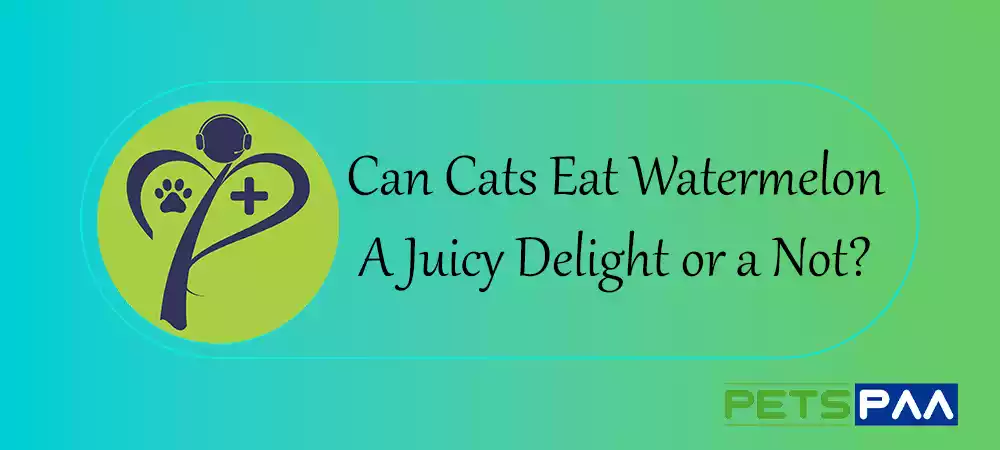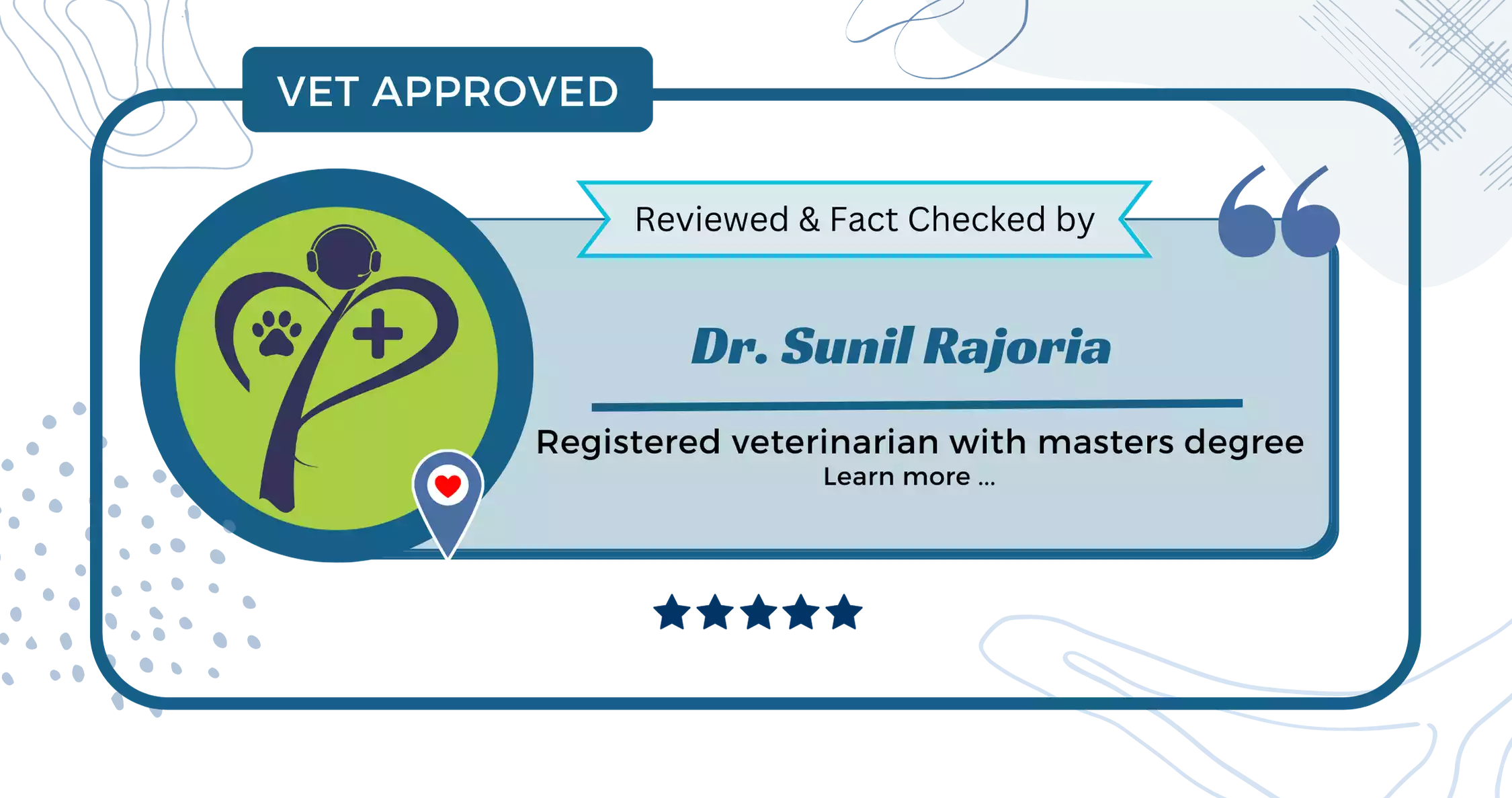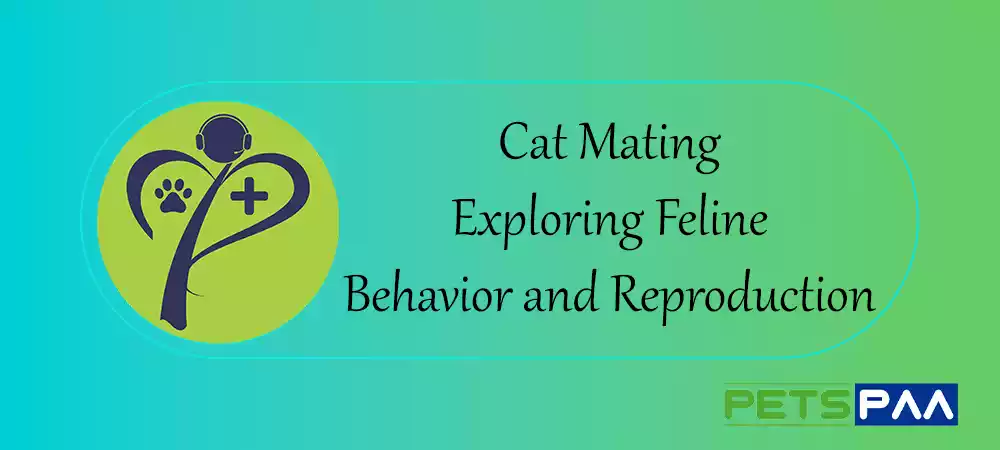Can Cats Eat Watermelon: A Juicy Delight or a Not?
Can cats eat watermelon? The short answer is… meow-surely! YES! But hold your curiosity, fellow cat enthusiasts, because there’s more to this juicy tale. Join us as we unravel the mysteries of feline fruit cravings.
From watermelon wonders and health considerations, we’ll dig our claws into everything you need to know. Get ready for whisker-licking insights that will leave you feline fine about feeding your cat this summertime treat!
Table of Contents
Can Cats Eat Watermelons?
Welcome to PetsPaa, your one-stop destination for all things relating to pets and their well-being.
In this post, we will look into the question: Can Cats Eat Watermelons?
Cats have unique dietary needs so it is very important to understand if a watermelon is a safe and suitable treat for them. Let’s dive in and discover the answers!
Cat's Dietary Requirements
Before we get into the specifics of feeding watermelon to cats, it’s important to understand their dietary needs which differ from us.
Cats are obligate carnivores which means they must eat meat to survive. They require critical nutrients like protein, taurine, and certain vitamins, but their digestive systems cannot handle plant-based diets as effectively as omnivores or herbivores.
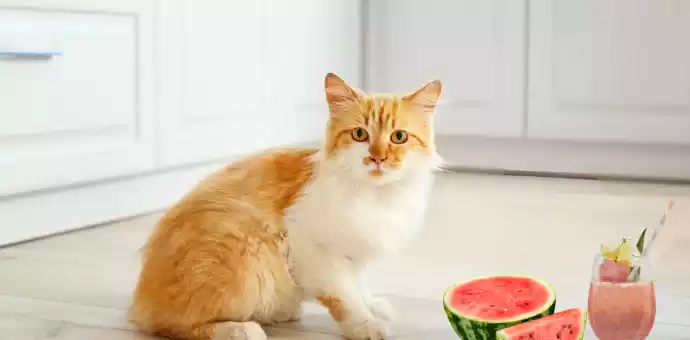
Do Cats Enjoy Watermelons?
Cats have distinct taste preferences, and not all of them enjoy watermelons. Some may be uninterested, while others may be. It’s crucial to remember that individual tastes differ among cats, so watching your feline pal’s reaction to watermelon can help you understand their affinity for this fruit.
Is Watermelon Good for Cats?
In moderation, watermelon may be a delicious and hydrating treat for cats. Watermelon is primarily water that keeps your cat hydrated, especially during the hot summer months. Furthermore, watermelon provides critical vitamins such as vitamin A and vitamin C, which can benefit a cat’s general health.
Can Cats Eat Watermelon Rind?
While cats can eat watermelon rind, it is not recommended. The rind can be difficult to chew and digest, which can lead to digestive disorders like stomach distress or even obstructions. To minimize difficulties, remove the rind before serving watermelon to your cat.
Can Cats Eat Watermelons Seeds?
Watermelon seeds are tiny and unlikely to be harmful if ingested in moderation. However, it’s still a good idea to remove the seeds before giving your cat watermelon. Large quantities of seeds might cause choking hazards or intestinal obstructions.
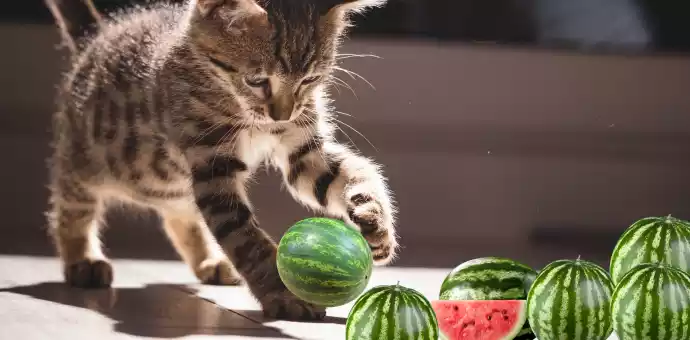
What About Freeze-Dried Watermelon?
While some cats appreciate the texture and freshness of frozen watermelon, it is essential to use caution. Frozen food may be rough on a cat’s teeth, and unexpected temperature fluctuations can be painful. If you decide to feed your cat frozen watermelon, make sure it’s slightly thawed to avoid dental difficulties.
Can Kittens Eat Watermelon?
Kittens have sensitive digestive systems that are still growing, so avoid giving them watermelon. Their primary diet should be high-quality kitten food that meets their nutritional requirements. Watermelon, like any other new food, should be introduced gradually and only after contacting your veterinarian.
How Much Watermelon Is Too Much?
While watermelon might be good in little doses, remember that moderation is essential. Due to its high water content, feeding your cat too much watermelon might cause intestinal problems or an upset stomach. Watermelon should only be provided as an occasional treat to eat, not as a large portion of your cat’s diet.
Are There Nutritional Benefits to Feeding Cats Watermelon?
While watermelon isn’t required for a cat’s diet, it can provide certain nutritional advantages when consumed in moderation. Let’s look at the main nutrients contained in watermelon:
Watermelon Nutrition and Composition
| High water content (over 90%) |
| Low in calories |
| Contains natural sugars (fructose) |
| Provides small amounts of vitamins A and C |
| Offers trace amounts of potassium |
Pros of Feeding Cats Watermelon
- Hydration: The high water content of watermelon can help keep your cat hydrated. especially when they don’t drink enough water on their own.
- Vitamins: It provides vitamin A, which maintains good vision, and vitamin C, which strengthens the immune system.
- Antioxidants: Watermelon includes antioxidants, which can help reduce inflammation and improve general health.
- Fibers: Cats do not require as much fiber as herbivores, little amounts of watermelon can aid digestion and help cats maintain a healthy weight.
Is Watermelon Bad to Cats?
While watermelon has several advantages, it may not be good for cats in some instances. Let’s look at why watermelon is terrible for cats:
When Is Watermelon Harmful to Cats?
- Watermelon allergies: Some cats may be allergic to watermelon, resulting in symptoms such as vomiting, diarrhea or skin irritation. If you observe any negative responses, stop feeding the watermelon right once and see a veterinarian.
- Medical Conditions: Certain health issues, such as diabetes or renal disease, may necessitate stringent food control in cats. In such instances, it is better to avoid introducing watermelon without first consulting with a veterinarian.
- Overfeeding: Feeding excessive amounts of watermelon can cause digestive disorders such as diarrhea or upset stomach; always feed watermelon in moderation and conjunction with a balanced meal.
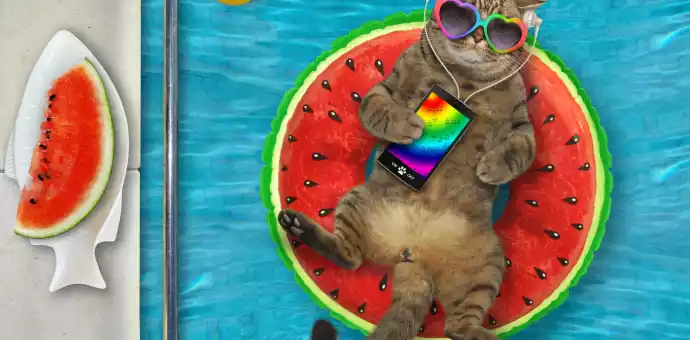
Cons of Feeding Watermelon to Cats
While watermelon has several advantages, it is important to be aware of the following disadvantages:
- Digestive Upset: Due to their delicate digestive systems, some cats may have gastrointestinal difficulties such as diarrhea or stomach distress when exposed to watermelon.
- Dental Issues: The natural sugars in watermelon can lead to dental problems in cats, such as plaque accumulation or tooth damage. Proper dental care and brushing regularly can help alleviate these difficulties.
What Would Happen If Your Cat Ate Some Watermelon?
There’s no need to fear if your cat accidentally swallows a little quantity of watermelon or steals a slice when you’re not looking. Small ingestions should not be harmful in most circumstances.
If your cat exhibits indications of discomfort, such as vomiting or extended diarrhea, it is better to consult a veterinarian.
Is it safe for diabetic cats to eat watermelon?
Diabetes requires careful nutritional control in cats, and introducing new foods, such as watermelon, should be done carefully. Watermelon has natural sugars that might cause blood sugar levels to rise. Consult your veterinarian before giving your diabetic cat watermelon or any other fruit.
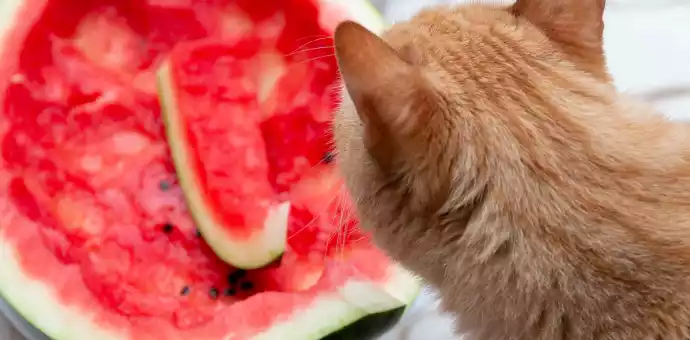
How Can I Safely Feed Watermelon to My Cat?
The following recommendations should be followed to guarantee your cat may safely eat watermelon:
- Remove the rind and seeds: As previously said, before giving your cat watermelon, remove the seeds and thick rind.
- Serve in tiny, bite-sized pieces: To avoid choking concerns, cut the watermelon into small, cat-friendly pieces.
- Gradually introduce: If this is your cat’s first time eating watermelon, introduce it gradually in little portions to watch their reaction and ensure it complies with their digestive system.
- Moderation is essential: Watermelon should only be given as a treat and should not be used to substitute a balanced meal designed particularly for cats.
Can Cats Eat Fruit?
Watermelon is only one type of fruit that some cats adore. It is crucial to remember that not all fruits are suitable for cats.
Some fruits, such as grapes and raisins are hazardous and should be avoided at all costs. Before adding any new fruit to your cat’s diet, do your homework and consult with your veterinarian if you have any concerns.
Healthy Snacks Alternatives
If you’re seeking for healthy snack alternatives to give your cat, have a look at the following options:
- Lean beef, cooked: Plain-cooked chicken or turkey may be a protein-rich and fun treat for cats.
- Cat-specific foods include: Choose commercially available cat snacks that have been specially developed to fit their nutritional requirements.
- Fresh foods: Some cats appreciate prepared or boiled vegetables like carrots or green beans. Always check that they are safe and appropriate for feline eating.
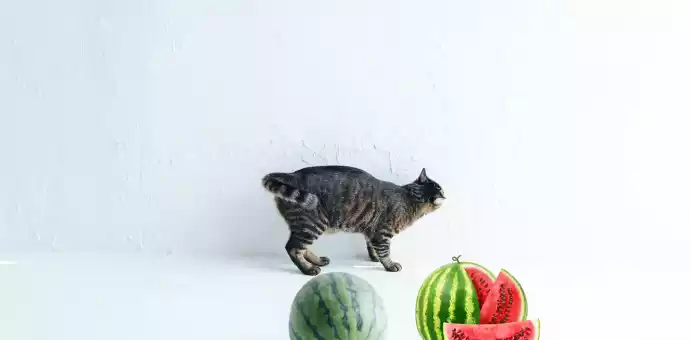
Key Takeaways
- Cats have special nutritional requirements since they are obligate carnivores and must eat meat.
- When given in moderation and without seeds or rind, watermelon can be safe for cats.
- Watermelon delivers water as well as trace levels of vitamins and antioxidants.
- Before introducing watermelon or any new food to your cat, carefully evaluate his or her specific health issues and nutritional requirements.
- Consult your veterinarian if you have any concerns/queries regarding your cat’s diet.
Conclusion
Although cats may theoretically eat watermelon, it’s crucial to use caution and only give it to them sometimes. Watermelon may be a delicious and hydrating treat for cats but it should never be their sole source of nutrition.
Remember that each cat is unique, and their tastes and health problems should be addressed when introducing any new food. As responsible pet owners, we must prioritize our feline friends’ well-being and seek professional help when necessary.
FAQs (Frequently Asked Questions)
Watermelon is not toxic to cats. In fact, it can be safe for cats to consume in moderation. However, it’s important to remove the seeds and rind before offering watermelon to your feline friend.
Cats are naturally curious creatures, and their attraction to watermelon may stem from its sweet aroma and juicy texture. Additionally, watermelon contains high water content, which can be appealing to cats, especially in hot weather.
Cats can enjoy certain fruits in moderation. Some safe options include small pieces of ripe banana, mashed blueberries, or cooked pumpkin. Remember to introduce new fruits gradually and always remove any seeds or pits.
Yes, some fruits can be toxic to cats. Grapes, raisins and citrus fruits like oranges or lemons should be avoided as they can cause severe health issues. Always research before offering any new fruit to your cat.
Watermelon can be safe for pets, including cats when offered in appropriate portions. It’s important to remove seeds and rind, as they can pose a choking hazard or cause digestive issues. Always monitor your pet while they enjoy watermelon.
Watermelon is generally not bad for pets when given in moderation but excessive consumption can lead to digestive upset or an upset stomach due to its high water content. Offer watermelon as an occasional treat, not as a primary food source.
Watermelon is not toxic to most animals, including cats. However, certain pets, such as birds or small rodents, may have difficulty digesting watermelon. It’s always best to research the specific dietary needs of your pet species before offering them watermelon.
If your cat accidentally eats a watermelon seed, don’t panic. In most cases, a single seed should pass through their digestive system without causing any harm. In any discomfort, it’s advisable to consult a veterinarian for guidance.

